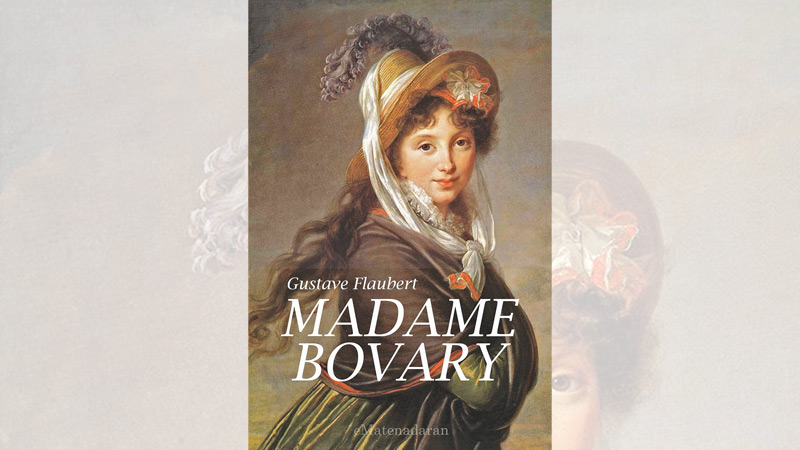Let me be nostalgic about my reading in the good old days; one final fling on my read-on Gustave Flaubert’s “Madame Bovary”, prior a tranquil retirement. I reckon that I ought to settle my inventive imaginations of not being a synonym for Flaubert’s central protagonist Emma Bovary, but being enlightened by Flaubert’s quote that takes my eyes on “An infinity of passion can be contained in one minute, like a crowd in a small space”. Beyond a shadow of doubt, ‘Madame Bovary’ is a terrific novel; its every page, being decorated with immensely rich and sensibly crafted prose add glamour into the romanticism of the 19th century with its passion in every inch.
Nearly two decades following my studies on ‘19th century French Realism, Gustave Flaubert and his controversial debut masterpiece “Madame Bovary” had infiltrated my bookshelf. The other day, a chum of mine whose research interests have got a deliberate focus onthe Normandy battles in the Middle Ages suggested that I listen to a beguiling and entrancing discussion, aired on BBC radio related to the trial on the ban of ‘Madame Bovary’. Despite the ban, imposed by the then French government, following its first publication in 1856, Madame Bovary, a household name in the 19th century French literature is arguably one of the most persuasive and dominant novels in the 19th century: it is more or less a synonym for French Realism.

Crimes against public morals As, Flaubert was put on trial for crimes against public morals that eventually led to the ban of his book, I invariably and indisputably disliked Madame Bovary and its central protagonist Emma Bovary as I was in my prime and I used to develop a rude sense of anger towards her. The story that deals with the suicide of the wife of Dr Charles Bovary in rural 1840s Normandy with no doubt at all sounded so lacking in its originality as to be apparent, evident, stuffy and stodgy, when my whims and fancies are taken into account. Albeit, I still refused to develop an interest in Emma, I consistently went through Flaubert’s words that decorated his Madame Bovary whose overt sexuality took him to the courts.
In contrast, my sheer anger on Emma gradually receded with the passing of time and decades by decades, Emma stole my heart as an enduring and durable protagonist who could even be an icon in the domain of world literature. By now, I am in all ears to destructive criticism, levelled against Emma, as a seductive woman, and I endure my tolerance on such criticisms whilst calling Emma, as a charming and helpless woman whose marriage was not a bed of roses. I have a heavy heart for Emma, the delightful and endearing country girl who got painted on the mind of Flaubert, ties the knot with a doctor, ultimately takes her life: she swallows arsenic and gives birth to an arduous and agonizing death.
Emma conceals and shields utopian and quixotic romantic phantom. Her heart sets on poise, urbanity and refinement. Depression Excessive ennui invades her in no time.
Relentless and bleak sense of depression takes her prisoner which is beyond the reach of matching the romantic fiction that she reads and cherishes. Critics prefer calling ‘Madame Bovary’ an explication and exposition on the bourgeoisie and tag rag and bobtail, an idiocy of yearning that are beyond realizing; it is simply a belief in the rationality of a self-contended and hoodwinked personal culture, surrounded by Flaubert’s era. This was eminent notably during the reign of Louis Phillippe, the last king of France.
How far the protagonist Emma Bovary has dived into the hearts of the reading community is its direct impact on the clause: “The Madame Bovary Syndrome” – a chronic affective dissatisfaction. Romantic illusions that inherent in Emma’s life, her difficulties in feeling contended and being surrounded by unhealthy relationships led to the coining of the syndrome that goes by her name. Vividness that Flaubert adds into the novel’s style is his prowess, its meticulously penned prose is identical with poetry.
Emma’s enormous obsession with romantic novels brings out the dangers of romantic delusions and an illusion is a critical lesson, taught through Madame Bovary. Living in her imaginations with romantic fantasies, while being addicted to romantic novels fuel her non-viable and impractical aspirations of love and satisfaction. Emma runs behind the mirage of her damaging addiction that gives rise to her fantasy of achieving romantic royalty and nobility where she in vain but to no avail does not understand the fact that such opulent and luxurious love and wealth are not realistically within her approach.
Being married to a middle-class doctor who is not capable and remarkable, Emma runs into despair and eventually finds that her debt is colossal and never be repaid; being crippled with borrowings and no way of repaying at the horizon, committing suicide becomes her ultimate remedy..



















